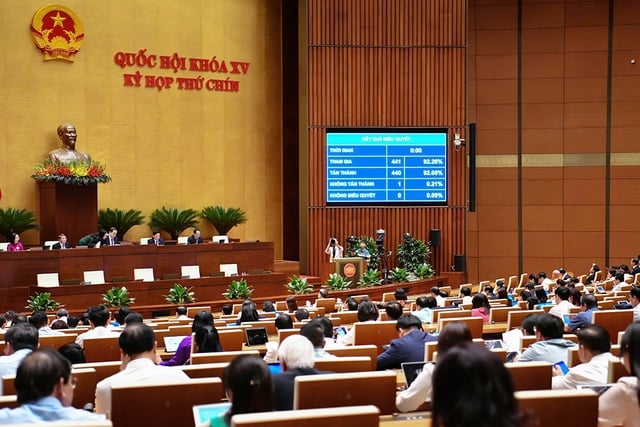The resolution stipulates tuition fee exemption for preschool children, primary and secondary school students, and those enrolled in general education programs in public educational institutions. Simultaneously, it provides tuition fee support for preschool children, primary and secondary school students, and those enrolled in general education programs in private and non-governmental educational institutions. The amount of tuition fee support is determined by the Provincial/City People's Council, based on the tuition fee framework stipulated by the Government, but shall not exceed the tuition fees charged by private and non-governmental educational institutions.
In his report on the draft resolution, Minister of Education and Training Nguyen Kim Son stated that this regulation ensures that tuition fee support in the locality does not exceed the tuition fee framework (floor - ceiling) as stipulated by the Government . In cases where private educational institutions charge less than the floor level according to the tuition fee framework stipulated by the Government, the local government's tuition fee support will be equal to the tuition fee charged by the educational institution.
The Standing Committee of the National Assembly also agreed with the revised content of the draft resolution, while maintaining the regulation to be applied from the 2025-2026 school year to give the Government time to prepare the necessary conditions.
Regarding the draft resolution on universal preschool education for children aged 3-5, the Minister of Education and Training stated in the report on feedback and explanations that the majority of delegates agreed on the necessity of the resolution. The Government has also directed the Ministry of Education and Training to conduct a specific assessment of the current situation, forecast the number of children, and the investment resources. Accordingly, the network of preschool education facilities has expanded to all communes, wards, villages, and hamlets nationwide.

The National Assembly voted to approve a resolution on waiving tuition fees for public school students nationwide starting from the 2025-2026 school year. PHOTO: PHAM THANG
Annually, over 5.1 million preschool children (including 4.5 million children aged 3-5) are nurtured, cared for, and educated in 15,256 preschools and 17,444 independent preschool education facilities, achieving a preschool enrollment rate of 93.6%. However, preschool education still faces many challenges, with nearly 300,000 preschool children yet to attend classes, mainly in remote, disadvantaged areas and those with special circumstances.
Exemption from agricultural land use tax until the end of 2030.
Later that same day, with 443 out of 444 National Assembly delegates voting in favor, the National Assembly passed a Resolution extending the exemption from agricultural land use tax until the end of 2030. The Resolution clearly states that the extension of the exemption from agricultural land use tax, as stipulated in Resolution No. 55 of 2010 and related resolutions, will last until December 31, 2030.
Reporting on the revisions and amendments to the draft resolution before the National Assembly's vote, the Chairman of the Economic and Financial Committee, Phan Van Mai, stated that some opinions suggested not exempting land that is left fallow, unproductive, or used for purposes other than intended from taxes. In addition, other opinions proposed specifying concrete criteria for tax exemption and imposing sanctions on those who abuse the policy to misuse land or accumulate land, leaving it fallow.
The Standing Committee of the National Assembly believes that, in reality, the misuse of land, the abandonment of land, and the waste of resources are still quite common. The goal of supporting agriculture, farmers, and rural areas, and the policy of exempting agricultural land use tax, also needs to meet the objective of encouraging organizations and individuals to use land economically and efficiently. Therefore, criteria are necessary to classify and identify appropriate tax-exempt subjects to ensure that support is provided to the right recipients and that land use is used effectively.
However, specifying the criteria for determining which land is eligible for tax exemption and which is not, for abandoned or misused land, requires time for appropriate research and preparation. The draft resolution on continuing the exemption of agricultural land use tax submitted to the National Assembly by the Government at this time has not yet addressed the aforementioned issues.
Furthermore, the 2024 Land Law includes several provisions aimed at addressing the issue of abandoned agricultural land. Simultaneously, land law has stipulated the authority of relevant agencies in carrying out state management tasks regarding land and applying sanctions for violations of land use regulations. Therefore, to ensure the resolution is issued promptly and to avoid interruptions in policy implementation, the Standing Committee of the National Assembly proposes that the National Assembly retain the draft resolution regarding the subjects eligible for tax exemption.
The Standing Committee of the National Assembly requests the Government to conduct a full and comprehensive assessment of the current situation and effectiveness of agricultural land use over the past period, and the effectiveness of the agricultural land use tax exemption policy on agricultural economic development and farmers' lives, in order to develop appropriate policy solutions. In the short term, the Committee requests the Government to provide full guidance on the provisions of the Land Law and implement practical solutions to ensure that land resources are not left fallow or wasted, to prevent and address cases of policy abuse, and to improve the efficiency of land management and use in general, and agricultural land in particular.
Penalties for personal data breaches can reach up to 3 billion VND.
With 443 votes in favor, representing 90.59%, the National Assembly passed the Law on Personal Data Protection on the morning of June 26th. In the report on the amendments and revisions to the draft law, the Chairman of the National Defense, Security and Foreign Affairs Committee, Le Tan Toi, stated that there were suggestions to clearly define the responsibilities of cross-border platforms such as Google, Facebook, TikTok, etc., and to require them to have representative offices in Vietnam.
According to the National Assembly Standing Committee, the revised draft law has clarified the scope of application and the responsibilities and obligations of cross-border platform providers such as Google, Facebook, and TikTok, which do not have representative offices in Vietnam and process user data of Vietnamese citizens entirely outside the territory of Vietnam. Regarding the requirement for cross-border platforms like Google, Facebook, and TikTok to have representative offices in Vietnam, this will be implemented according to the provisions of the Cybersecurity Law and the Data Law. These laws already contain provisions requiring representative offices in Vietnam or the placement of servers in Vietnam, depending on specific conditions.
The draft law also amends the regulation prohibiting the buying and selling of personal data, except where the law provides otherwise. The draft law also redesigns the regulations on handling violations of the law on personal data protection (Article 8) according to the nature, extent, and consequences of the violation. Specifically, the act of buying and selling personal data can be fined up to 10 times the revenue obtained from the violation; for violations of regulations on cross-border personal data transfer, the maximum fine is 5% of the revenue of the previous year; for other violations, the maximum fine is 3 billion VND; and the penalty for individuals is half that for organizations.
In addition, some delegates also suggested clarifying the purpose of management and removing the regulation requiring notification to the subject when recording audio or video in public places, such as traffic and security cameras. The reason given was that it is impractical and difficult to implement in reality. The Standing Committee of the National Assembly stated that it has directed a review and revision of regulations requiring agencies, organizations, and individuals to notify or "through other means of communication" the subject of personal data about being recorded, except in cases where the law stipulates otherwise.
Source: https://thanhnien.vn/mien-hoc-phi-cong-lap-ho-tro-hoc-phi-dan-lap-tu-thuc-185250626223001767.htm



![[Photo] Head of the Central Propaganda and Mass Mobilization Department visits and congratulates the Ministry of Health and the Military Traditional Medicine Institute.](https://vphoto.vietnam.vn/thumb/1200x675/vietnam/resource/IMAGE/2026/02/24/1771938483290_img-2682-3562-jpg.webp)

![[Photo] White pear blossoms bloom across the border of Pho Bang](https://vphoto.vietnam.vn/thumb/1200x675/vietnam/resource/IMAGE/2026/02/24/1771927665653_a8-8280-jpg.webp)


![[Image] A dreamy "livable city" under pink clouds](https://vphoto.vietnam.vn/thumb/1200x675/vietnam/resource/IMAGE/2026/02/24/1771930060937_tp4-jpg.webp)







































































































Comment (0)